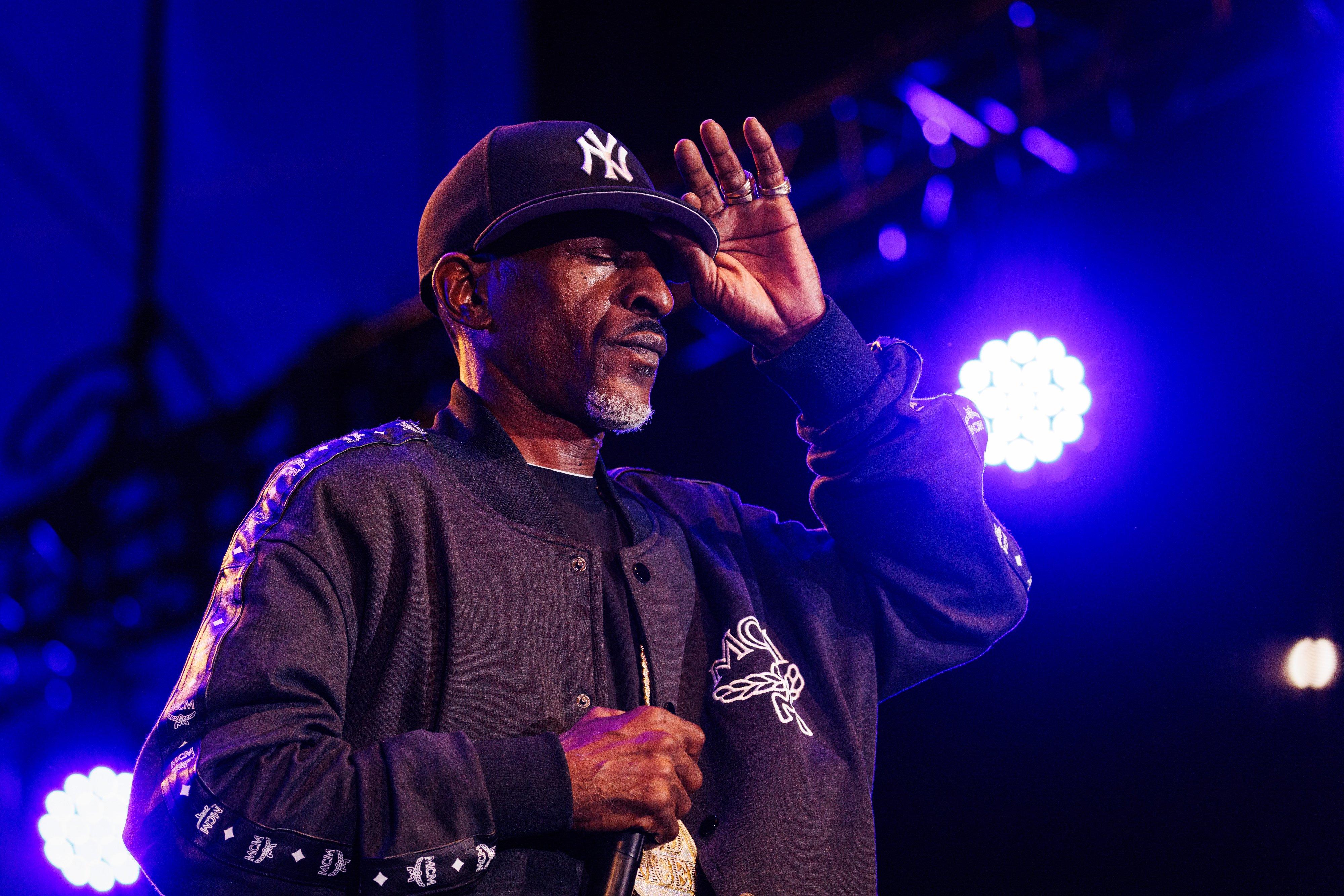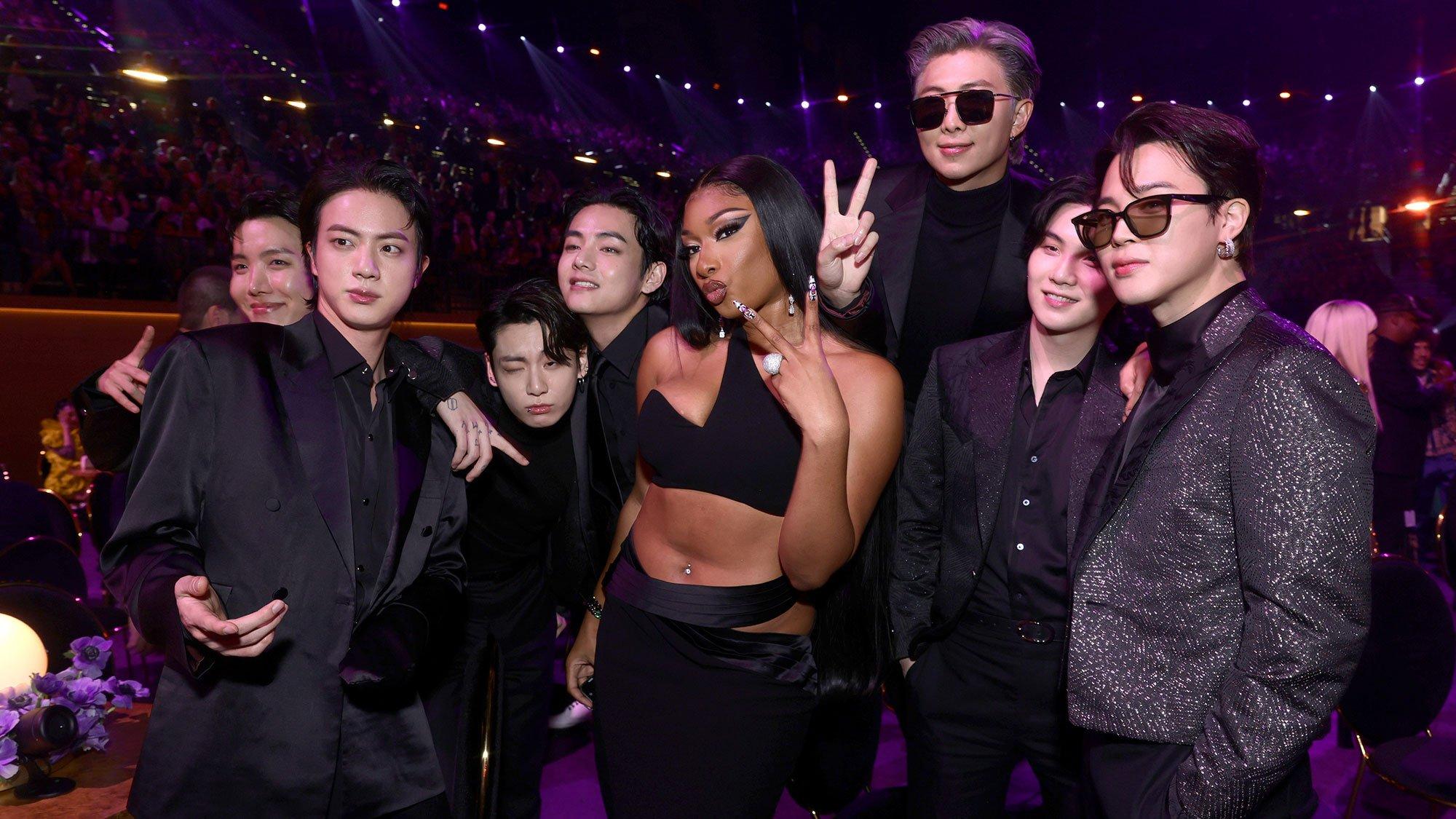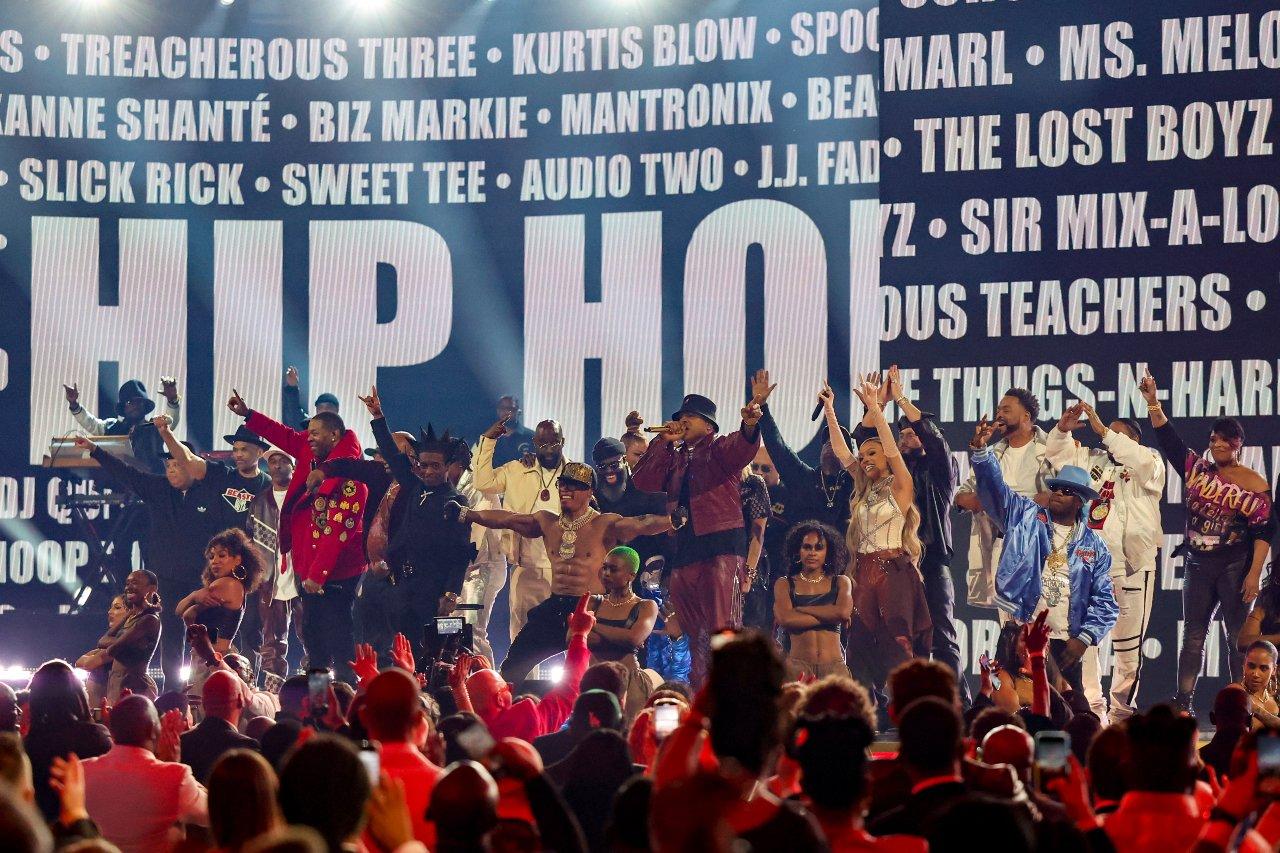When Banda MS came across a video on Instagram in which a subdued Snoop Dogg offers their song "Tengo Que Colgar"—a track about painfully walking away from a dishonest relationship—as solace to Dodger fans after a major loss took the Los Angeles baseball team out of the world series in 2016, they weren’t sure it was real. After all, it’s not every day a gangsta rap legend reveals he’s got love for a Mexican regional band from Mazatlan, Sinaloa, even if they are one of Mexico’s most successful and trailblazing (Banda MS were top ten on Billboard’s 50 top charting Latin artists along with J Balvin, Shakira and Bad Bunny in 2018, a year considered major for Latin music worldwide). While popular among Latinos in the U.S., banda music hasn’t produced any general market co-signs like reggaetón has, so Snoop Dogg being a fan was a bit surprising. "We laughed thinking it was a meme,” Oswaldo Silvas, one of the two band vocalists, recalls.
But the video wasn’t an internet concoction—it was real. By now, anyone religiously following the "Gin N Juice" rapper on social media knows he’s a fan of both Latin music and artists—he even has a collab with Ozuna on his 2019 album I Wanna Thank Me. More specifically, though, he is a Mexican regional music enthusiast, having uploaded videos of himself lip-syncing songs by artists like the late Jenni Rivera, who, like Snoop, is an alum of Long Beach Polytechnic High School in California.
Snoop’s defeated sports moment, in which he chose a banda song to cap a disappointing season, is reflective of the black and brown cultural exchanges that happen in Los Angeles, and was exciting for the almost 20-piece wind-and-percussion band, which was founded by Sergio Lizárraga in 2003. When a collaboration with Snoop organically came together years later, the band, who pride themselves on having a distinct musical style that only continues to expand banda music, knew they couldn't lose their essence. As a result, "Que Maldicion," which has over two million plays on YouTube, is a perfect mix of banda music and Snoop's G-Funk.
The Recording Academy recently spoke with band vocalists Oswaldo Silvas and Alan Ramirez—who admit they were a little nervous about how fans would react to the single—from Mazatlan, Sinaloa, Mexico. They told us more about how the collab came about, how they hope a song like this can take banda music to new audiences without compromising their touch, being recognized by the city of Los Angeles, their stylistic vision and more.
The interview has been edited and translated from Spanish to English.
<style>.embed-container { position: relative; padding-bottom: 56.25%; height: 0; overflow: hidden; max-width: 100%; } .embed-container iframe, .embed-container object, .embed-container embed { position: absolute; top: 0; left: 0; width: 100%; height: 100%; }</style><div class='embed-container'><iframe src='https://www.youtube.com/embed/nljSRHfUOAg' frameborder='0' allowfullscreen></iframe></div>
How did this collaboration come about?
Oswaldo Silvas: This arose, I think about two, three years ago, when Snoop Dogg uploaded a video to his Instagram of him listening to Banda MS' music. That took everyone by surprise. We laughed thinking it was a meme, but no, he confirmed with another video that he really liked Banda MS' music. He's also said in interviews many times that he likes regional Mexican music. That really caught our attention. Time passed, we never forced anything. It feels good to say the collaboration wasn't forced. We were patient until the right time came. More than two years went by before we got in contact and were able to truly make a collaboration happen. Banda MS made the song; it was written by Omar Tarazón and arranged by Pavel Ocampo [and then] the song was sent to Snoop Dogg and he contributed his part, the rap part.
A lot of people may find the song's theme relatable now in quarantine because it's about missing someone. What is the inspiration behind this song? Is it based on personal experience?
Oswaldo Silvas: Many of Banda MS' songs are about love or heartbreak. The song, as I mentioned, was written by Omar Tarazón, who has written for Banda MS many times. I don't know what his inspiration was, but it rings a bell now as we're missing so many things right now. There are a lot of people who are missing someone special during these moments that we are in lockdown. After all, the song was made in the Banda MS style, in Tarazón's style, and I think a lot of people are enjoying it, the numbers speak for themselves. We were still very nervous [the day it launched], nervous about how people were going to react to it, how the fans were going to take it, how all the critics were going to take it and thank God, [while] there have been divided opinions, most people love the song and we are very grateful for that.
The song is a good balance of Banda MS and Snoop Dogg's style, respectively. How did you achieve that balance?
Oswaldo Silvas: My colleague Pavel Ocampo, who was in charge of the arrangements, he and Sergio Lizárraga, achieved that balance without letting go or jumping over banda music's boundaries, respecting what banda music is. The importance of this collaboration is precisely that, that a world-famous artist, like Snoop Dogg, comes to sing on a Sinaloan banda's track. It's what is really impressive, because we could have done a collaboration with him and tried to rap, or something like that. I think that would not have given us the same result. Banda music's [stylistic] boundaries were respected. He did his thing with hip-hop, rap, and all that [together] achieved a balance. That is the beautiful thing, that is the artistic thing of this song, to manage to balance all that well and not go out to do something grotesque, or something that would make us uncomfortable, or something that made us look like we forgot about the banda genre. There was that balance.
Latin music, particularly reggaeton, is now attracting many big-name artists who work with English-language music. "Despacito" is an example. Now you come in with this mega song that is taking regional music to new places. I know when Sergio Lizárraga started the group, he wanted to evolve the band's style, but did you imagine anything on this level?
Oswaldo Silvas: No, we never imagined this. Believe us, a duet like this was never in our minds, never. If we've been open to collaborations, it's been with other genres of music like pop, but with both Mexican and Spanish-speaking artists. This collaboration with an artist of this caliber, we had never even imagined. It's something to celebrate. You mentioned "Despacito," how it transcended. I think it gives Latinos pride to see a song [in Spanish] achieve those [cross-cultural] fusions. Although our music doesn't fall under the genre, I can imagine people who are from Puerto Rico, the people who are Latino and who make reggaeton, how they felt listening to those collaborations.
In the same way, we'd think that banda music, banda musicians, the groups and the Mexican audience that likes banda music, that they would feel as proud. It is a great sense of pride for Banda MS too, to know we are doing things well and that we are representing Mexico in a way, we'll say, in a dignified way because it is what we try to do, to represent our music, to represent our Mexico in a dignified way.
Here in L.A., the song was played on Power 106, a hip-hop station, and KCRW, an NPR-affiliated station. That doesn't happen every day. What does reaching new audiences mean to you?
Oswaldo Silvas: Imagine how we feel knowing that and realizing how radio announcers are so important in the United States, who are not Spanish-speaking, are playing Banda MS' music because of this collaboration. We are very proud, we are very happy. Something I was going to tell you regarding this, I think this has to open a very important door. It has to open a door that will allow banda music to continue transcending, it is our purpose. Our dream is to take Banda MS' music very high, internationally, globally. The purpose of Banda MS is to make banda music, the banda genre, recognized and heard around the world; it is our purpose, and that it be done in this way because it is one thing to be heard and another thing to be liked. The purpose is that you like banda music.
<style>.embed-container { position: relative; padding-bottom: 56.25%; height: 0; overflow: hidden; max-width: 100%; } .embed-container iframe, .embed-container object, .embed-container embed { position: absolute; top: 0; left: 0; width: 100%; height: 100%; }</style><div class='embed-container'><iframe src='https://www.youtube.com/embed/4VTCCw8Ywww' frameborder='0' allowfullscreen></iframe></div>
You're from Mazatlán, Sinaloa in Mexico but a few months ago you received recognition from the city of Los Angeles for uniting the community. Tell me about your relationship with your audience in Los Angeles and in the United States.
Oswaldo Silvas: Los Angeles is definitely [home to] a huge Latino community. I'll confess that it was difficult for us to cross into Los Angeles. When we got to Los Angeles there was a music movement that had nothing to do with Banda MS; it was a time when corrido's new wave [was happening]. When Banda MS arrived in Los Angeles, we came with a song called "El Mechón." At first, it was difficult to [musically] cross into the Los Angeles area, [but] we are very pleased that today Los Angeles is one of the cities that has given us the greatest support. Across the United States, there is a lot of support for Banda MS, but Los Angeles gives us special affection. There are many people from Sinaloa, many other people, who like band music and when we are there it is always a success. We were last there at the Staples Center with two dates. It was something unmatched for us, invaluable to us, in our career. The Los Angeles crowd will always be invaluable to us.
What do you think helped you get a strong following there?
Oswaldo Silvas: I think we didn't do anything special. Not because at the time there was a new wave of music. Did we want to make music [with that sound]? No, not at all. We have always tried to conquer our audience with the essence that we have, with the essence of what Banda MS is. I think we have been very consistent, we have been very consistent. We have always tried not to change the essence of Banda MS, but we do mature, we do advance in our [own way], when it comes to Sinaloan music. I think that consistency has been the fundamental factor in being able to reach people's taste.
You have a 20 member band, how do you organize yourselves in the studio? Are there any rules?
Oswaldo Silvas: Let's put it this way, there are departments. We assign ourselves a certain number of people for each group. There is a group of people who are in charge of the musical stuff, who are in charge of the recordings, who are in charge of the selection. That group of people is a small group of people and decisions by them are respected. It is part of the order that we have in Banda MS.
There are people who take care of what the image of the band is, there are people who take care of the live shows, there are people who take care of the media. We have always respected each area that's why there can be order, we can all reach an agreement. We respect the group of people who choose the songs from the albums; all that. So this works.
Are you currently working on new music or other projects?
Oswaldo Silvas: Every day we are working on the recording of new songs, we are close to finishing a new album. We are always working on digital content, we are always doing interviews, we are always working on social media. There is always something to do. We do not want to rest on our laurels, as they say, we want to keep moving forward, we want to keep growing. There is still much more to conquer, and for that you need to work.
Is there another collaboration that you'd want to do with an artist from anywhere in the world?
Alan Ramirez: We are open for any collaboration, we have never forced anything. Me and my colleague Walo [Oswaldo] have said before that we would love to do something with reggaeton. A person that we admire and respect is Daddy Yankee. J Balvin too, Nicky Jam, who seem like good people, who are calm and who I know would be a good collaboration.
RIAA Report: Latin Music Is Growing Faster Than The Overall U.S. Music Market










